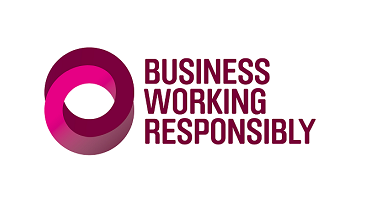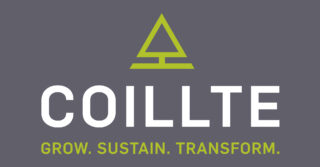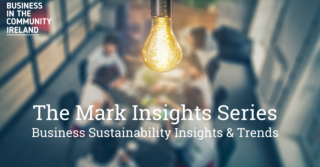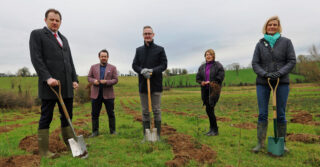Governance as a C suite topic
The Business Working Responsibly mark Insights Series on Governance
 Welcome to our new series of sustainability insights and trends with data gathered from the analysis of our 40 Business Working Responsibly Mark certified companies. While the insights are gleaned from all of our certified companies, particular attention is focused on the most recent trends from our current cohort under the new certification process.
Welcome to our new series of sustainability insights and trends with data gathered from the analysis of our 40 Business Working Responsibly Mark certified companies. While the insights are gleaned from all of our certified companies, particular attention is focused on the most recent trends from our current cohort under the new certification process.
This Insights Series was initially developed for our members and we are delighted to now share this content with the wider public. Last year we launched a new, more robust and evidence-based sustainability certification process. Similar to ISO 9001 and other management system based certifications, the new Mark requires robust governance structures and a clear understanding of the impact that the company has on its local community, the environment, and wider society.
This first article from the series discusses Governance and how it underpins the rest of the CSR and Sustainability approach, over the coming weeks we will publish specific insights on the topics of: Environment, Social, and Marketplace.
Key Insight – Governance as a C-Suite Topic
“Sustainability is not a committee, a role, or a report….It is the outcome of your business strategy.” Rodney Irwin, World Business Council for Sustainable Development at BITCI (December 2020)
What does good governance look like? A decade ago, having a dedicated resource for CSR was a luxury. Often it was a part-time role with a volunteer committee coordinating grassroots employee volunteering and environmental initiatives. As CSR became more professionalised, oftentimes split off, with the Environmental Health and Safety Manager taking over the environmental initiatives, HR leading the employee groups, and then Marketing or Communications responsible for community initiatives and volunteering. One of those three roles sometimes also became the de facto coordinator of the larger CSR approach. The only time CSR was mentioned in a Board meeting was within the context of employee engagement or good public relations. In many organisations this remains the structure, but increasingly we’re seeing a fourth player in the game, the commercial business itself. The commercial business brings with it funding, resources, and a commercial governance structure which has the potential to significantly accelerate an organisation’s CSR agenda. It is at this stage that CSR becomes a C-Suite conversation.
The Mark Standard requires senior leadership oversight and advocacy as one of its tenets, and while this can happen in any of the governance models described above, it is the commercial-led model that demonstrates leadership buy-in to the CSR agenda most clearly.
Governance Key Insight – Organised Around Impact
In this commercial inclusive model it’s quite common for financial and non-financial (environmental, social, and ethical) aims to become integrated into a purpose-led strategy designed around impact. In terms of defining impact, leading organisations are increasingly aligning with the Sustainable Development Goals (SDGs). The SDGs provide a framework for linking an organisation’s commercial strategy with 17 critical societal needs. An example of this alignment might be an organisation with a large and complex supply chain, where there are significant environmental and human rights risks. SDGs 8 (Decent Work and Economic Growth) and 12 (Responsible Consumption and Production) both speak to the adverse societal impact that unmanaged social and environmental risks in supply chains can have. This creates the business case for a clear and transparent path from the current state to the desired future outcome.
SDG alignment is one way of identifying and aligning with impact, but the Mark standard requires ongoing consultation with key stakeholders as well. While many organisations still manage stakeholders in siloed groups, Mark leaders increasingly demonstrate an integrated approach to Stakeholder Engagement. This sets the tone for transformational conversations on economic, social, and environmental impact with employees, customers, suppliers, and other key stakeholder groups. These conversations aren’t just one-way, or intended to manage critical voices, instead they are an open forum for engagement involving diverse views that drive innovation. The conversations result in innovative new approaches, channels for collective impact, and deep and trusted relationships that evolve over time.
Governance Key Insight – Reporting Rigour
The integration between commercial and CSR goals is evident in a highly mature organisation’s annual report. Often the organisation’s purpose and strategy will be comprehensive of commercial, ethical, social, and environmental aims. There will be a clear and metrics-driven commercial strategy with ethical, social, and environmental targets stated alongside the financial targets. The strategy will be focused on the most impactful areas as defined not just by the organisation itself, but as stated above, through ongoing, transparent and active engagement with stakeholders.
The Mark standard requires ongoing monitoring, evaluating and reporting of key metrics. The most mature Mark-certified organisations use a metrics-driven approach, report detailed information externally, and validate all claims and metrics. They use frameworks like the Global Reporting Initiative (GRI), Carbon Disclosure Project (CDP) to demonstrate rigour. Some independently audit their CSR and other non-financial information.
Transparency in reporting is another key insight from our Mark companies. Leading Mark certified organisations aren’t just publishing the good news, but also where they have not met their goals as well and how they are working to course correct or to gain ground lost due to disruptions like Covid-19. In the spirit of transparency, leading organisations will also externally publish their internal supplier, customer, and employee policies in addition to the business codes of conduct and anti-slavery statements. This transparency demonstrates a sincere commitment to stakeholder accountability which again, is one of the hallmarks of the new purpose-led organisation.
The governance model of the future
Over the past year we have seen a seismic shift in stakeholder expectations. Leading organisations across Ireland are rising to the challenge and quickly adapting, and in some cases even transforming, their governance models to match stakeholder needs. Business in the Community Ireland’s Advisory Service supports organisations who wish to mature and grow their governance models.
The Mark Sustainability Standard Certification Service provides an assessment for organisations who wish to understand their maturity within these new expectations and a certification process for those organisations who have the requisite management systems already in place.
Find out more about the leading sustainability certification The Business Working Responsibly Mark.
If you are a member please contact your Adviser for more information.
Tags:






